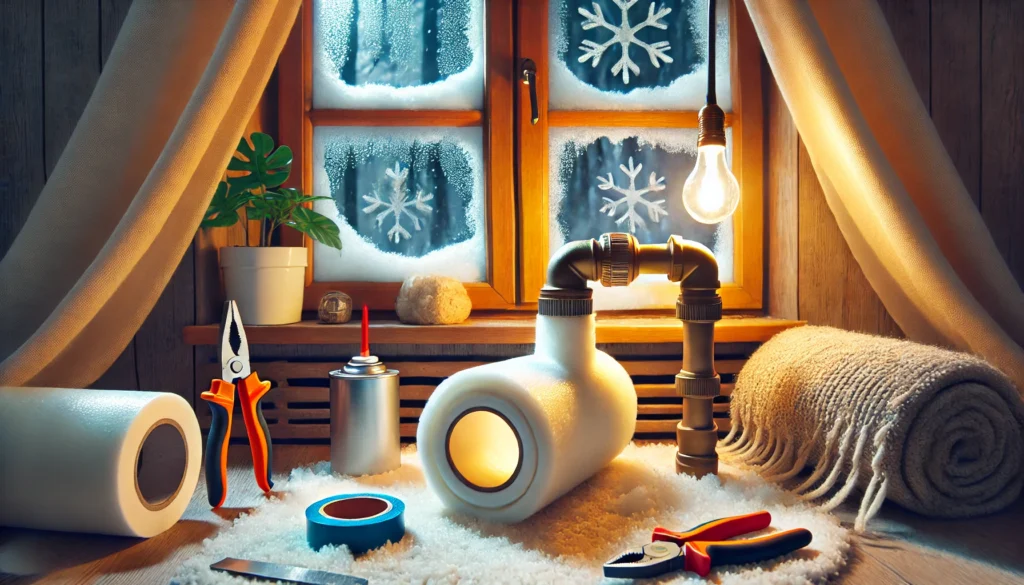
How to Prevent Burst Pipes During Winter: A Homeowner’s Guide

Burst pipes are one of the most common and costly problems homeowners face during winter. Freezing temperatures can cause water inside your pipes to expand, leading to cracks, leaks, or even a complete pipe burst. However, with a few preventative measures, you can safeguard your plumbing system and avoid expensive repairs. Here’s a comprehensive guide to protecting your pipes from freezing temperatures.
Why Do Pipes Burst in Winter?
When water freezes, it expands, increasing pressure inside the pipe. If the pressure becomes too great, the pipe can crack or burst, especially in vulnerable areas such as outdoor or uninsulated pipes.
Common Risk Factors:
- Uninsulated pipes in exposed areas.
- Sudden drops in temperature.
- Infrequent use of water during cold spells.
- Poor heating in unoccupied spaces like attics or basements.
Signs Your Pipes Are at Risk
- Frost or condensation forming on exposed pipes.
- Reduced water flow from taps during freezing weather.
- Unusual noises, such as gurgling or banging, in your plumbing system.
Steps to Prevent Burst Pipes
1. Insulate Your Pipes
Insulation is one of the most effective ways to protect your pipes from freezing.
How to Insulate Pipes:
- Use foam pipe sleeves or lagging to wrap exposed pipes in unheated areas.
- Pay extra attention to pipes in basements, attics, garages, or external walls.
- Seal gaps around pipes entering your home to reduce drafts.
Tip: Look for pre-slit pipe insulation for easy installation.
2. Keep Your Heating On
Even if you’re away during winter, maintain a low temperature inside your home.
What to Do:
- Set your thermostat to at least 12–15°C, even when the house is unoccupied.
- Use smart thermostats to regulate heating remotely.
- Open interior doors to allow warm air to circulate around pipes.
3. Let Taps Drip
A slow drip of water from your taps can relieve pressure in the system, preventing freezing.
Why It Works:
- Flowing water is less likely to freeze.
- It reduces pressure build-up in the pipes, even if freezing occurs.
Tip: This is especially useful for pipes in exposed or poorly insulated areas.
4. Protect Outdoor Plumbing
Outdoor taps and pipes are particularly vulnerable to freezing.
What to Do:
- Disconnect garden hoses and drain outdoor taps.
- Install insulated covers or frost guards on outdoor taps.
- Shut off and drain external water supplies if not needed during winter.
5. Use Heating Tape or Cables
Electric heating tape or cables can keep water flowing in vulnerable pipes.
How to Use:
- Wrap heating tape around exposed pipes, particularly in extremely cold areas.
- Follow manufacturer instructions to ensure safe installation.
Tip: Use heating tape as a supplement to pipe insulation for added protection.
6. Seal Drafts and Gaps
Cold air entering your home can increase the risk of freezing pipes.
How to Prevent Drafts:
- Check for gaps around windows, doors, and pipe entry points.
- Use weatherstripping, caulking, or expanding foam to seal these areas.
- Close vents in unused rooms to reduce heat loss.
7. Drain Unused Plumbing Systems
If a property will be vacant during winter, draining the system can prevent freezing.
Steps to Drain Pipes:
- Shut off the main water supply.
- Open all taps to let water flow out of the system.
- Use compressed air to clear residual water, if possible.
Tip: Hire a professional plumber for thorough winterisation.
What to Do If Pipes Freeze
Despite your best efforts, pipes can sometimes freeze during severe cold spells.
Steps to Take:
- Turn off the water supply to the affected area.
- Locate the frozen section of the pipe (usually frosty or bulging).
- Gradually thaw the pipe using a hairdryer, heat lamp, or warm towels. Avoid using open flames, as this can damage the pipe or cause a fire hazard.
- Monitor for leaks as the pipe thaws.
Tip: If the pipe bursts, contact a plumber immediately and shut off the main water supply.
Why Prevention Matters
Fixing a burst pipe can cost hundreds or even thousands of pounds, not to mention the potential damage to floors, walls, and belongings. Preventative measures are far less expensive and time-consuming, making them a worthwhile investment for every homeowner.
Keep Your Plumbing Safe This Winter
Protecting your pipes from freezing temperatures doesn’t have to be complicated. By insulating exposed pipes, maintaining consistent heating, and taking proactive steps during cold weather, you can significantly reduce the risk of burst pipes. With these strategies in place, you’ll enjoy a warm and worry-free winter while saving money on potential repairs. Take action now to secure your home and plumbing system against the chill!
4o